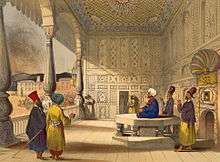Habibullah Khan
| Habibu'llah Khan (King Habibullah I) | |
|---|---|
| Amir of Afghanistan | |
 | |
| Emir of Afghanistan | |
| Reign | October 1, 1901 – February 20, 1919 |
| Predecessor | Abdur Rahman Khan |
| Successor | Nasrullah Khan |
| Born |
June 3, 1872 Samarkand, Uzbekistan[1][2] |
| Died |
February 20, 1919 (aged 46) Kalagosh, Afghanistan |
| Father | Abdur Rahman Khan |
| Mother | Asal Begum, Uzbek consort |
Habibullah Khan (June 3, 1872 – February 20, 1919) was the Emir of Afghanistan from 1901 until 1919. He was born in Samarkand,[1][2] Uzbekistan, the eldest son of the Emir Abdur Rahman Khan, whom he succeeded by right of primogeniture in October 1901.
Habibullah was a relatively secular, reform-minded ruler who attempted to modernize his country. During his reign he worked to bring modern medicine and other technology to Afghanistan. In 1903, Habibullah founded the Habibia school as well as a military academy. He also worked to put in place progressive reforms in his country. He instituted various legal reforms and repealed many of the harshest criminal penalties. But one of his chief advisors Abdul Lateef was sentenced to death in 1903 for apostasy. He was stoned to death in Kabul. Other reforms included the dismantling of the repressive internal intelligence organization that had been put in place by his father.
He strictly maintained the country's neutrality in World War I, despite strenuous efforts by the Sultan of the Ottoman Empire and a German military mission to enlist Afghanistan on its side. He also greatly reduced tensions with British India, signing a treaty of friendship in 1905 and paying an official state visit in 1907.
Habibullah was assassinated while on a hunting trip at Laghman Province on February 20, 1919.[3] His brother Nasrullah Khan briefly succeeded him as Emir and held power for a week between February 21 and February 28, 1919, before being ousted and imprisoned by Amanullah Khan, Habibullah's third son.[4]
Honours
- Knight Grand Cross of the Order of St Michael and St George (GCMG) – 1896
- Knight Grand Cross of the Order of the Bath (GCB) – 1907[5]
References
- 1 2 Vogelsang, Willem (2002). "17-The dynasty of Amir Abd al Rahman Khan". The Afghans. LONDON: Willey-Blackwell, John Willey & SOns, Ltd, UK. p. 270. ISBN 978-1-4051-8243-0.
- 1 2 http://freepages.genealogy.rootsweb.ancestry.com/~royalty/afghan/i105.html#I105
- ↑ Islam and Politics in Afghanistan, Olesen, page 101
- ↑ Afghanistan 1919–1928: Sources in the India Office Records
- ↑
Sources
| Wikimedia Commons has media related to Habibullah Khan. |
| Regnal titles | ||
|---|---|---|
| Preceded by Abdur Rahman Khan |
Emir of Afghanistan 1901–1919 |
Succeeded by Nasrullah Khan |
|
